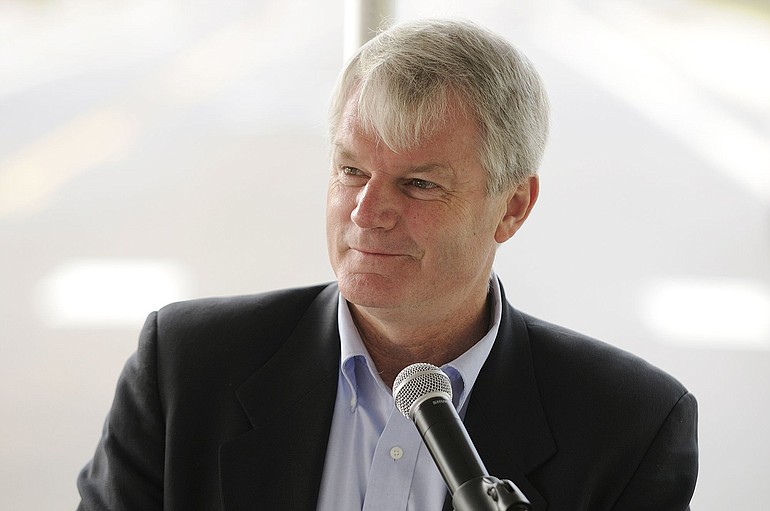On what could be his final congressional trip to the Middle East and the Persian Gulf, U.S. Rep. Brian Baird found reason for guarded hope in Iraq.
Baird left Washington, D.C., on May 28 and returned June 6. Traveling with Rep. Lincoln Davis, D-Tennessee, he visited Erbil in Iraq’s Kurdistan region and the Iraq city of Balad as well as Syria, Qatar and Lebanon .
The Vancouver Democrat, who supported President George W. Bush’s 2007 troop surge in Iraq, said he saw clear evidence of progress. Results of the recent Iraq election have been certified, he noted, and the withdrawal of American combat troops is proceeding.
President Barack Obama announced early in his presidency that he planned to withdraw all U.S. combat troops from Iraq by the end of August 2010, leaving between 35,000 and 50,000 military troops to help train and equip Iraq’s armed forces.
Baird said it may be time to put the brakes on that withdrawal, at least temporarily.
Iraqis “are forming a coalition government,” he said. “There’s an impression on the ground that people want to resolve this politically and not through violence.”
But it’s important the political situation in Iraq is resolved before the U.S. completes the withdrawal and hands off combat responsibilities to Iraq, he said.
“We have spent so many lives, so much money. They have made tremendous progress. If we had to delay five or six months to get it right, that would be time well spent.”
For one thing, it’s not clear that enough Iraqis have been trained to repair helicopters and maintain the nation’s infrastructure, he said.
“They are having to train up a whole new generation of technicians. Will they be ready to take the kind of reins that the current schedule has built in?”
A recent upsurge in violence in Iraq led the administration to announce in May that it was likely to delay the withdrawal of the first large group of combat troops from the country for at least a month beyond the scheduled Aug. 31 date.
Baird also commented on the Israeli navy’s May 31 attack on a flotilla carrying supplies to the residents of Gaza, which occurred while he was in the region. The commando raid was intended to intercept supplies that could be used by Hamas, Gaza’s ruling party, for possible military strikes against Israel. It killed nine pro-Palestinian activists and triggered demonstrations throughout the Muslim world.
At a conference he attended in Doha, Qatar, on the economic future of the Middle East, news of the attack on the flotilla was all over the BBC, CNN International and Al Jazeera, Baird said.
“Almost regardless of the topic, the tension between Israel and the Palestinians came up,” he said. The attack on the flotilla “just highlighted the problem. There’s no question it’s heightened tensions, particularly for the average person on the street.”
Baird has made several trips to Gaza to assess progress in rebuilding schools, homes, businesses and infrastructure since the territory was pummeled during the Israeli army’s 22-day military offensive against Hamas in late December 2007 and January 2008.
“I’ve spent more time in Gaza in the past two years than any American official,” he said.
Baird first became involved in Gaza after the death of 23-year-old Olympia peace activist Rachel Corrie, who was crushed to death by an Israeli bulldozer in 2003 while protesting the destruction of Palestinian homes in a refugee camp. Contacted by the young woman’s parents, who were his constituents, Baird called for a U.S. State Department investigation of Corrie’s death. He has continued to support the family’s quest for answers.
Since the attack on the flotilla, the Obama administration has called for increased aid to Gaza. “But it’s not enough to call for greater aid if it can’t get in,” Baird said.
He said he believes the U.S. Navy should deliver aid directly to Gaza with its own ships.
“The U.S. has to demonstrably show that we are sincerely interested in resolving the differences,” he said. “Most people don’t even know there is an Arab Peace Initiative. The president has been undermined by members of his own party, who don’t understand his initiatives.”
In addition, he said, the government of Israeli Prime Minister Benjamin Netanyahu “has directly undermined everything he has tried to do.”
Baird did not visit Gaza on this trip, but he said the plight of its residents remains dire, largely because of Israel’s blockade and restrictions on their movements.
“On a daily basis, the Israelis profoundly limit what can go in and out of Gaza,” he said.
He offered a poignant example: “The main cancer hospital is in East Jerusalem. There are children from Gaza with brain cancer, and sometimes it takes them many weeks to get permission to leave Gaza. They are not allowed to be accompanied by their parents, only elderly grandparents.”
“I would ask, put yourself in the shoes of a parent whose child has brain cancer and you are not allowed to be with that child. There are 600,000 children in Gaza under the age of 14. This is not to excuse the rockets coming from Gaza, and certain actions from Hamas, but it’s important to see the region through the eyes of people in the region.”
Kathie Durbin: 360-735-4523 or kathie.durbin@columbian.com.



